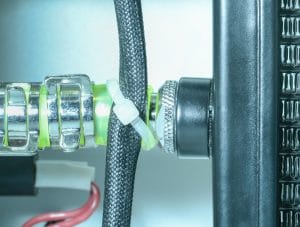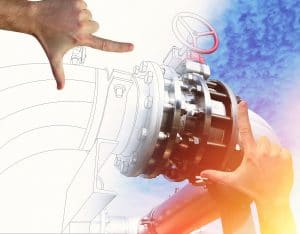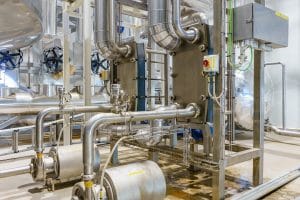 Heat exchangers became popular as a more affordable and eco-friendly solution than air conditioners for electrical thermal management. They achieve these benefits by eliminating the need to chill air with complex air-conditioning equipment, using simpler methods to transfer heat and prevent electrical overheating. However, there are many applications where chilled air is necessary to properly keep an electrical enclosure cooled. Whether that’s due to higher-than-usual energy output, particularly hot climates, or more, such applications have to be cooled to temperatures below the ambient temperature outside of the enclosures. Fortunately, high-performance, below-ambient heat exchangers can often provide the alternative, more cost-efficient solution they need. (more…)
Heat exchangers became popular as a more affordable and eco-friendly solution than air conditioners for electrical thermal management. They achieve these benefits by eliminating the need to chill air with complex air-conditioning equipment, using simpler methods to transfer heat and prevent electrical overheating. However, there are many applications where chilled air is necessary to properly keep an electrical enclosure cooled. Whether that’s due to higher-than-usual energy output, particularly hot climates, or more, such applications have to be cooled to temperatures below the ambient temperature outside of the enclosures. Fortunately, high-performance, below-ambient heat exchangers can often provide the alternative, more cost-efficient solution they need. (more…)
Ensuring Quality through Comprehensive Design
 Over the decade that they’ve been in service, heat exchangers have gained a reputation for providing reliable, high-performance thermal management for a wide variety of applications. Their success has helped countless companies dramatically reduce overhead by lowering energy costs, free up employee time by reducing the need for maintenance, and much more. However, like any product, heat exchangers and their successful operation rely on how well they’re manufactured. To ensure a consistently high level of quality, heat exchanger manufacturers focus on every detail and test every component before creating a final product. (more…)
Over the decade that they’ve been in service, heat exchangers have gained a reputation for providing reliable, high-performance thermal management for a wide variety of applications. Their success has helped countless companies dramatically reduce overhead by lowering energy costs, free up employee time by reducing the need for maintenance, and much more. However, like any product, heat exchangers and their successful operation rely on how well they’re manufactured. To ensure a consistently high level of quality, heat exchanger manufacturers focus on every detail and test every component before creating a final product. (more…)
How Heat Exchangers Fit into Oil & Gas Manufacturing
 Before implementing new technology into any industry, it first has to pass several tests to ensure that it can successfully meet the unique demands of that industry. For the oil and gas industry, those demands are especially challenging given the hazardous conditions that are often a routine part of operations. Fortunately, when it comes to streamlining thermal management for advanced technology, certain heat exchangers are specifically designed to benefit oil and gas companies, as well as others that operate under hazardous conditions. This means more companies can enjoy the benefits of heat exchangers even in environments that could prove too much for more sensitive technologies to handle. (more…)
Before implementing new technology into any industry, it first has to pass several tests to ensure that it can successfully meet the unique demands of that industry. For the oil and gas industry, those demands are especially challenging given the hazardous conditions that are often a routine part of operations. Fortunately, when it comes to streamlining thermal management for advanced technology, certain heat exchangers are specifically designed to benefit oil and gas companies, as well as others that operate under hazardous conditions. This means more companies can enjoy the benefits of heat exchangers even in environments that could prove too much for more sensitive technologies to handle. (more…)
Benefiting from Greener Thermal Management
 Thermal management was one of the first areas in which technological innovation meant greener, more efficient operations for most industries. That’s because most industries rely on advanced technology, and creating more efficient and eco-friendly electrical cooling with heat exchangers instead of air conditioners benefited all of them. Today, those benefits continue to multiply as companies continue adopt greener technologies, especially as more of those technologies utilize heat exchangers for their electrical thermal management needs. (more…)
Thermal management was one of the first areas in which technological innovation meant greener, more efficient operations for most industries. That’s because most industries rely on advanced technology, and creating more efficient and eco-friendly electrical cooling with heat exchangers instead of air conditioners benefited all of them. Today, those benefits continue to multiply as companies continue adopt greener technologies, especially as more of those technologies utilize heat exchangers for their electrical thermal management needs. (more…)
Automation Made Easier with the Help of Heat Exchangers
 Streamlining electrical thermal management has placed heat exchangers at the crux of advancing technology for several decades. For companies that relied on that technology, the ability to break free from their reliance on air conditioning-based electrical thermal management meant fewer maintenance headaches and lower energy expenditures. For designers continuously innovating more advanced technology for those companies to use, heat exchangers granted the freedom to design more compact devices and machinery that packed more power into smaller spaces. One of the most impactful benefits of that freedom has been automated technology, whose development and adoption have helped companies streamline their operations even further. (more…)
Streamlining electrical thermal management has placed heat exchangers at the crux of advancing technology for several decades. For companies that relied on that technology, the ability to break free from their reliance on air conditioning-based electrical thermal management meant fewer maintenance headaches and lower energy expenditures. For designers continuously innovating more advanced technology for those companies to use, heat exchangers granted the freedom to design more compact devices and machinery that packed more power into smaller spaces. One of the most impactful benefits of that freedom has been automated technology, whose development and adoption have helped companies streamline their operations even further. (more…)
Thermal Management as Part of an Application’s Initial Design
 It’s no secret that electrical thermal management is vital to any technology’s continued operation. Yet, designers of that technology don’t always consider that need in their initial designs, usually because they don’t have the expertise to fully understand which thermal management systems could enhance their designs most effectively. Instead, thermal management may be relegated to traditionally problematic solutions, such as air conditioning or compressors that can inhibit the design’s overall function. That’s why many of today’s leading technology design companies work closely with highly experienced thermal management experts to ensure that their designs include an efficient and reliable heat transfer system, such as heat exchangers. (more…)
It’s no secret that electrical thermal management is vital to any technology’s continued operation. Yet, designers of that technology don’t always consider that need in their initial designs, usually because they don’t have the expertise to fully understand which thermal management systems could enhance their designs most effectively. Instead, thermal management may be relegated to traditionally problematic solutions, such as air conditioning or compressors that can inhibit the design’s overall function. That’s why many of today’s leading technology design companies work closely with highly experienced thermal management experts to ensure that their designs include an efficient and reliable heat transfer system, such as heat exchangers. (more…)
Questions About the Advantages of Heat Pipes
 Some of the most common types of heat exchangers utilize heat pipe technology to some degree, mainly because they often provide the most efficient and comprehensive thermal management results. Their ability to keep electrical waste heat continuously circulating away from sensitive equipment without needing complicated machinery to do it makes heat pipes one of the more effective thermal management solutions. Their high level of customizability to meet a variety of applications’ needs makes them one of the more often relied on solutions, as well. (more…)
Some of the most common types of heat exchangers utilize heat pipe technology to some degree, mainly because they often provide the most efficient and comprehensive thermal management results. Their ability to keep electrical waste heat continuously circulating away from sensitive equipment without needing complicated machinery to do it makes heat pipes one of the more effective thermal management solutions. Their high level of customizability to meet a variety of applications’ needs makes them one of the more often relied on solutions, as well. (more…)
Thermal Management Needs that Most Industries Share
 While every company faces its own unique challenges, there are certain issues that are common among every industry. Thermal management is one of the most significant of those common challenges. The specific thermal management needs a company faces and how it decides to address them depend on many different factors. However, things like electrical cooling for control cabinets and other electrical enclosures, or consistent heating for processes such as wastewater treatment, are hurdles that they all face. Such common thermal management needs are also typically addressed most efficiently with modern, high-performance heat exchangers. (more…)
While every company faces its own unique challenges, there are certain issues that are common among every industry. Thermal management is one of the most significant of those common challenges. The specific thermal management needs a company faces and how it decides to address them depend on many different factors. However, things like electrical cooling for control cabinets and other electrical enclosures, or consistent heating for processes such as wastewater treatment, are hurdles that they all face. Such common thermal management needs are also typically addressed most efficiently with modern, high-performance heat exchangers. (more…)
More than Manufacturing – The Everyday Uses of Heat Exchangers
 Manufacturing technology and equipment is well-known for its high demands on energy and maintenance. It’s also well-known how significantly heat exchangers can lower those demands in the realm of electrical thermal management. However, those same benefits make heat exchangers more common than many people realize, especially when it comes to everyday household items that they may not realize operate on heat exchanger technology. In fact, everything from food and beverage refrigeration to cooling advanced electronics have benefited from the adaptation of modern heat exchanger technology. (more…)
Manufacturing technology and equipment is well-known for its high demands on energy and maintenance. It’s also well-known how significantly heat exchangers can lower those demands in the realm of electrical thermal management. However, those same benefits make heat exchangers more common than many people realize, especially when it comes to everyday household items that they may not realize operate on heat exchanger technology. In fact, everything from food and beverage refrigeration to cooling advanced electronics have benefited from the adaptation of modern heat exchanger technology. (more…)
Can Heat Exchangers Really Affect Productivity?
 One of the biggest reasons why heat exchangers have been so widely adopted over the last few decades is because they significantly lower energy costs by cooling electrical enclosures more efficiently than air conditioners. Given a company’s reliance on technology, especially in the manufacturing industry, it should be no surprise that the ability to more efficiently cool that technology can significantly benefit a company’s output. However, the many ways in which heat exchangers’ efficiency impacts a company’s overall productivity isn’t always as obvious until after they’ve been implemented. (more…)
One of the biggest reasons why heat exchangers have been so widely adopted over the last few decades is because they significantly lower energy costs by cooling electrical enclosures more efficiently than air conditioners. Given a company’s reliance on technology, especially in the manufacturing industry, it should be no surprise that the ability to more efficiently cool that technology can significantly benefit a company’s output. However, the many ways in which heat exchangers’ efficiency impacts a company’s overall productivity isn’t always as obvious until after they’ve been implemented. (more…)







